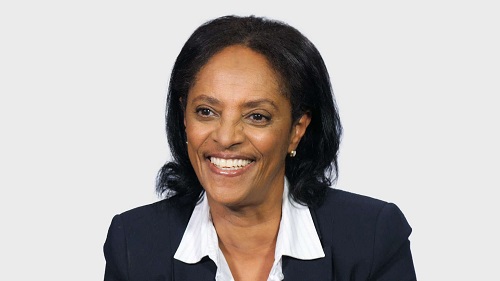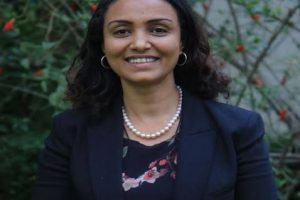
BY BETHLHEM BEDLU
Professor Yalemtsehay Mekonnen is a bio-medical scientist, a Professor of cell and human physiology and Head of the Gender Office of the College of Natural and Computational Sciences (CNCS), Addis Ababa University.
She was born in Assela Town and was the first child amongst her four siblings in her family. Given the fact that her father was member of the army, their life had been here and there. Thus, she had to attend her primary education in Dessie and Gojjam (Finote Selam) towns and finished her secondary education in Addis Ababa Menelik II Secondary School.
She is the first woman professor in Ethiopia. With her firm and committed character, she is amongst the few people who can change the age long wrong perception attached to women- in characterizing their roles none other than home chores and child caring.
As she was very passionate about science related subjects, she was leading the top scores of all students. For this reason, she was able to join university while she was only 16 years old. Unfortunately, she could not complete her higher education on timedue to the unrest that was mobilized during the then regime.
The following is the interview that Professor Yalemtsehay Mekonnen had with the Ethiopian Press Agency. Enjoy your reading.
Can you walk us through your career background in short?
I started my academic career as a lecturer teaching different courses. In 1988, I left for the University of Heidelberg in Germany to do my PhD in Human Physiology with a special focus in the area of Endocrinology (the biology of hormones). Upon completing my PhD, I came back and continued serving the Department of Biology at the rank of Assistant Professor from 1992 until 1999.
After serving there for about seven years, I was promoted to the rank of Associate Professor in 1999. Besides my teaching and research engagement, I also served as the Head of the Department of Biology from 1993 to 1995 and as the Director of the Aklilu Lemma Institute of Pathobiology from February 2003 to October 2007.
Currently, I am the Head of the Gender Office of the College of Natural and Computational Sciences (CNCS) where we give advice to students and organize different forums like reproductive health, assertiveness trainings. I am a mother of two and a grandmother of two grandchildren.
How did you balance being a mother as well as a bio-medical scientist, and your multi roles?
I have spent my entire life in education and teaching. So, the major challenge was balancing my family life with my career. It was when I obtained my first degree that I gave birth to my first child. And I also attended my second degree program raising my other children. Though I can manage the situation accordingly, it had its own influence on my performance.
As my passion was to teach and do research, it was hard to make both things go along together. Having to cover household responsibilities, raising children, leading the family life, at the same time trying to be competitive in the outdoor activities with their male counterparts is hard.
Nonetheless, I have received my BSc degree in Biology in 1978 and later joined the first graduate program and gained my M.Sc. degree in Biology in 1980, among the first batch of graduates in the field, and the first woman in the country.
What is your biggest accomplishment in your career?
I have received more than ten awards from different institutions like that of the African Union Kwame Nkrumah Regional Scientific Awards for Women in January 2016; Grant for Research Group Linkage of the Alexander von Humboldt Foundation with the University of Hohenheim, Germany in 2014; a gold Medal award by Addis Ababa University in 2009, and Certificate of Recognition by the International Institute of Rural Reconstruction (IIRR).
More importantly, I feel very proud when thinking of the number and quality of students I created in the past four decades of service especially I feel satisfied when I see the women who have reached to the PhD level and more. I feel so fulfilled whenever I see my students serving their country and even in other part of the world.
My other biggest achievement is the most challenging decision I had made to go abroad and do my PhD while I had to leave my kids with their father. It is not the fact that I did my PhD; but passing through those challenges that I was supposed leave my family alone even though my husband and parents were supportive was challenging.
This was a very tough decision. But the PhD served me as the stepping stone for the academic recognitions I received today. Moreover, my contribution to the community and my organization is, as I mentioned earlier, producing students at first degree, second and PhD level.
On top of that, after three years of my return from Germany, I went to the southern part of Ethiopia and started doing research on medicinal plants especially on Moringa Stenopetala (shiferaw/Alekko Shekatta). This research work has also served as a stepping stone to another mega project which I am part of right now that is funded by the Ministry of Science and Technology. My other contribution towards the organization is that I took responsibilities as committee member, heading and directorship positions in the past and currently and so on.
How did you reach your level of success given the sector’s gender gap especially in the field of science?
My families are the major reasons and the backbone of my success. It is because they had served me with the basic things and put me to school and encourage me to try new things that I am here today. Even though the one who taught me the basics in reading, etc was my grandfather, my father was also literate person.
I believe that my parents should take the credit for my success. My father and mother, including my grandfather have put their efforts and contributed hugely for the state that I found myself today.
The Ethiopian Herald April 24/2021




